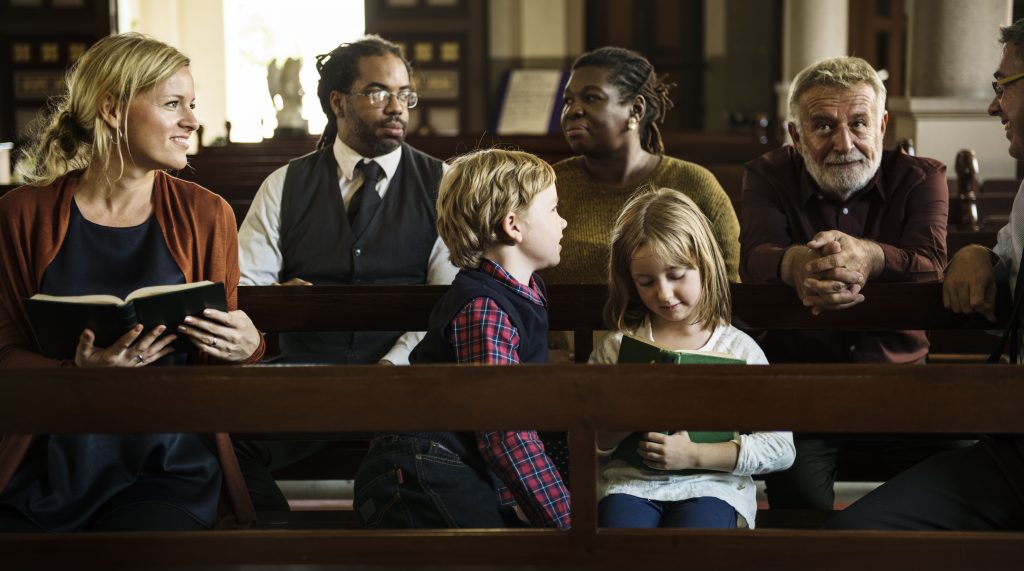To be informed is to be formed-in a truth or a process. It is a formation or growth of our inner lives. To be informed about our Catholicism is to be formed-in our beliefs. What are our beliefs? Are they Catholic information that we have received and accept as true or are they something more?
What is the meaning of the word “belief”? The origins of the word point to a combination of two words: to “be-” and “-lief,” derived from an Indo-European word for “loving, holding dear.” Beliefs, then, could be understood as that which we hold dear to our existence. Catholic belief can be thought of as a Christ-like way of being in the world that forms us in truth and love.
Full, conscious and active participation at liturgy is the primary way we are both in-formed and formed-in our Catholic beliefs. The Sacraments of the Church, celebrated in the context of the Mass, shape our Catholicism, but we can also grow in our beliefs by seeking specific information.
Each sacramental ritual book contains the outline, instructions, descriptions and spoken prayers for our traditions. The sacristy (sacramental preparation room) of each church has a library of these ritual books. Each book begins with a praenotandae or introduction. These introductions can serve to inform our experience of the sacraments. They are instructive in nature and reflect a theological understanding of the ritual that has developed up to this moment in our church history.
It is important to remember that our ritual books are a living record of the actions of the church at prayer. These rituals are not static. Like all of life, they are organic. They have been revised and adapted at various times throughout church history. The General Introduction of each of the ritual books we use today contains information that reflects a growing and evolving church. Let’s look first at our ritual of baptism or initiation. The church is regularly journeying with people, young and older, in a catechetical process leading to full membership in the one body of Christ. Since the Second Vatican Council, membership in the church as an adult is marked by the fuller sacramental process known now as Initiation.
The General Introduction to Christian Initiation in the Ritual Book for Adult Initiation is the same as in the Rite of Baptism for Children. The Sacraments of Initiation are Baptism, Confirmation and Eucharist, celebrated publicly, in that order, with each parish community at the Easter Vigil. This process is in line with the origins of Christian Initiation in the early church, and can be adapted to include children who have reached the age of discernment. One of the ways in which our sacramental understanding has grown is in the recognition of the importance of the role of the community in the celebrations of all the sacraments. These celebrations are public prayer rituals by which the whole community grows in faith and love.
“The people of God, that is the Church, made present in the local community, has an important part to play in the baptism of both children and adults … the faith … is not a private possession … but is the common treasure of the whole Church of Christ.” (Baptism of Children, Introduction, no. 4)
“The initiation of catechumens (those seeking baptism) is a gradual process that takes place within the community of the faithful. By joining the catechumens in reflecting on the value of the paschal mystery (Christ’s passion, death and resurrection) and by renewing their own conversion, the faithful provide an example that will help the catechumens to obey the Holy Spirit more generously.” (Rite of Christian Initiation of Adults/RCIA, Introduction, no. 4)
(Because of historical developments that led to the separation of the celebration of water Baptism and baptism in the spirit, or Confirmation, many children still participate in the first sharing of communion (First Communion) years before they celebrate the Confirmation of their faith. There are no “black and white” answers to this dilemma. Each parish community must struggle to find the most effective catechetical and pastoral approach to this issue.)
Participation in the liturgy continually informs our faith and beliefs. Our participation is an ever-rising spiral of growth in God’s plan for us, and for the world. As the one body of Christ, “the community must always be fully prepared … to give help to those who are searching for Christ … all the followers of Christ have the obligation of spreading the faith. … They should therefore show themselves ready to give the candidates (for baptism) evidence of the spirit of the Christian community. (RCIA no. 9)

